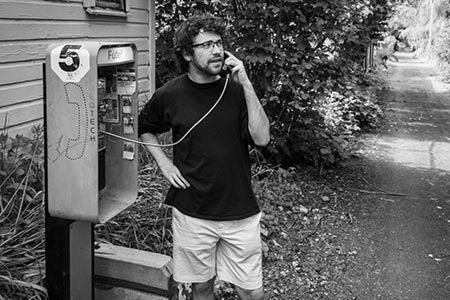By Riley O’Boyle CNA Media Team

Nestled in the alley between 27th and 28th avenues, between Killingsworth and Jarrett streets, stands a former pay phone.
There’s just one difference. You can leave your coins at home and call nearly anywhere in North America for free.
Futel, a Portland nonprofit telephone company, announced the installation in January. The first was installed on southeast Clinton Street in 2014, and Concordia’s is one of four additional local phones, the second in northeast Portland. One was installed in 2016 on Ainsworth Street at 8th Avenue.
There’s another on southeast Taylor Street and – thanks to a partnership with Village Coalition and Freewire – there’s a phone in homeless encampment Right 2 Dream 2. The first out-of-town unit was installed in March in Ypsilanti, Michigan.
Futel has several volunteers and contributors, including Regional Arts and Culture Council, Precipice Fund and Awesome Foundation.
Installation requires a host – with power and internet service – who is willing to share. The rest is managed by the dedicated network of volunteers who believe in the project. Last year 14,000 calls were made from the company’s phones, according to Karl Anderson, one of two men who created Futel.
The intent is twofold: to provide a social service for anyone who may not have a phone and an artistic mode of engaging with a community space.
“It’s a way of getting art in the community,” Karl explained at a May gathering of hardware aficionados hosted by Crowd Supply.
“It’s a part of the urban landscape that I never saw as disappearing,” he added. “I thought that they [pay phones] would always be there.”
From a social services standpoint, the phones offer more than free outgoing calls: incoming phone service, voice mail accounts and speed dialing to social services resources, TriMet Transit Tracker, weather forecasts, the Portland mayor’s office and an “apology line” patterned after one in New York City for people to unburden themselves to a recording.
Dial “0” and you’ll talk with Karl, fellow Futel founder Elijah St. Clair or another volunteer. “You can call us to answer what questions you might have or talk about whatever you want,” Karl offered.
The nonprofit’s costs are relatively low. Futel repurposes salvaged payphones, thrift store landlines, obsolete IT hardware kept alive with open source firmware and rented cloud computers.
“Then we buy phone service and we give it away free,” Karl said. “It’s not a technologically exciting thing. It’s a socially exciting thing.”
Riley O’Boyle, certified EIT, works in land development and site engineering, and can be reached at RSOboyle13@gmail. com